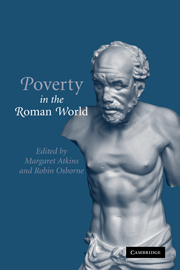Book contents
- Frontmatter
- Contents
- List of contributors
- Preface
- List of abbreviations
- Chapter 1 Introduction: Roman poverty in context
- Chapter 2 The poor in the city of Rome
- Chapter 3 Stratification, deprivation and quality of life
- Chapter 4 ‘You do him no service’: an exploration of pagan almsgiving
- Chapter 5 Writing poverty in Rome
- Chapter 6 Poverty and population in Roman Egypt
- Chapter 7 A pragmatic approach to poverty and riches: Ambrosiaster's quaestio 124
- Chapter 8 Portraying the poor: descriptions of poverty in Christian texts from the late Roman empire
- Chapter 9 Throwing parties for the poor: poverty and splendour in the late antique church
- Chapter 10 Salvian, the ideal Christian community and the fate of the poor in fifth-century Gaul
- Chapter 11 Poverty and Roman law
- Bibliography
- Index
Chapter 9 - Throwing parties for the poor: poverty and splendour in the late antique church
Published online by Cambridge University Press: 22 September 2009
- Frontmatter
- Contents
- List of contributors
- Preface
- List of abbreviations
- Chapter 1 Introduction: Roman poverty in context
- Chapter 2 The poor in the city of Rome
- Chapter 3 Stratification, deprivation and quality of life
- Chapter 4 ‘You do him no service’: an exploration of pagan almsgiving
- Chapter 5 Writing poverty in Rome
- Chapter 6 Poverty and population in Roman Egypt
- Chapter 7 A pragmatic approach to poverty and riches: Ambrosiaster's quaestio 124
- Chapter 8 Portraying the poor: descriptions of poverty in Christian texts from the late Roman empire
- Chapter 9 Throwing parties for the poor: poverty and splendour in the late antique church
- Chapter 10 Salvian, the ideal Christian community and the fate of the poor in fifth-century Gaul
- Chapter 11 Poverty and Roman law
- Bibliography
- Index
Summary
This chapter seeks to address a big question: how were ideas of poverty transformed by the church in late antiquity? In approaching this question it also asks how this church was itself able to come to terms with its own teachings on poverty in the light of its own ever-increasing wealth and splendour. This in turn leads us to consider how Christian writers, often themselves bishops, the princes of the church, represented both poverty and splendour. In this way I hope to provide something of a new take on the well-trodden subject of Patristic debates on poverty, particularly by focusing on questions of aesthetics and representation, through examining discourses regarding church decoration and its relationship to poverty and charity.
At the heart of the discussion is a slightly contrived conceit: the comparing and contrasting of two texts which give accounts of what I have admittedly loosely described as ‘parties for the poor’. These two texts provide interesting takes on early Christian approaches to poverty and wealth. While both the events depicted within the texts and their historical status differ, this juxtaposition nonetheless provides a striking introduction to the complex web of ideas and ideologies to be found in late antique Christian texts. In the course of my discussion I shall be considering what might be considered both ‘representation’ and ‘reality’, remaining alert to the power of metaphor and allegory while trying to avoid the problem of the occlusion of the late antique poor themselves.
- Type
- Chapter
- Information
- Poverty in the Roman World , pp. 145 - 161Publisher: Cambridge University PressPrint publication year: 2006
- 5
- Cited by



